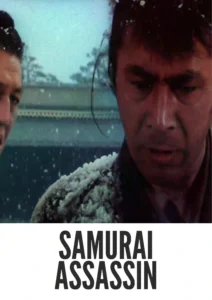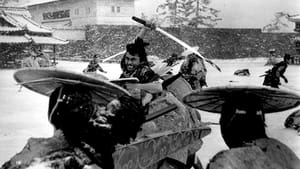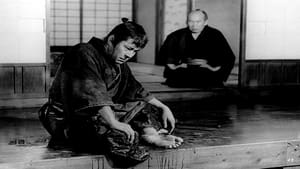Contact: info@alwanfilm.com
Video Sources 0 Views
Synopsis
Samurai Assassin 1965 Colorized Review: A Tale of Honor, Betrayal, and the Quest for Justice

Introduction
“Samurai Assassin 1965” emerges as a gripping and profound exploration of honor, betrayal, and the quest for justice in feudal Japan. Directed by Kihachi Okamoto, this epic tale unfolds against the backdrop of political intrigue and social upheaval, drawing viewers into a world of samurai warriors, clandestine assassins, and deadly vendettas. As we delve into the heart of this cinematic masterpiece, we uncover the significance of its early colored films version and its enduring legacy as a timeless saga of courage, sacrifice, and redemption.
Check The Full Colorized Movies List
Check Our Colorized Movies Trailer Channel
The Artistry of Samurai Assassin 1965 Colorized
Okamoto’s Visionary Direction
At the helm of “Samurai Assassin” is director Kihachi Okamoto, whose masterful direction infuses the film with a sense of urgency and emotional depth. Drawing on his deep knowledge of Japanese history and culture, Okamoto creates a rich and immersive world that transports viewers to feudal Japan with breathtaking authenticity. With its stunning cinematography, dynamic action sequences, and nuanced characterizations, the film stands as a testament to Okamoto’s ability to capture the essence of the samurai ethos with honesty and insight.
Compelling Performances
Central to the film’s impact are the powerful performances of its ensemble cast, led by Toshiro Mifune and Keiju Kobayashi. Mifune delivers a tour de force performance as Niiro Tsuruchiyo, a samurai warrior torn between duty and loyalty to his lord. Kobayashi shines as Yoshimura Yasubei, a conflicted assassin whose moral ambiguity adds depth and complexity to the film’s narrative. Together, they form a mesmerizing duo whose dynamic performances elevate the film to new heights of cinematic excellence.
Revisiting the Storytelling Mastery: Plot and Themes
A Saga of Honor and Betrayal
“Samurai Assassin” unfolds as a sweeping saga of honor and betrayal, following Tsuruchiyo as he embarks on a perilous mission to avenge the death of his lord. As he navigates the treacherous landscape of feudal Japan, he must confront the dark forces of corruption and injustice that threaten to engulf his homeland in chaos. Through its intricate plot twists and morally complex characters, the film explores the timeless themes of loyalty, sacrifice, and the quest for justice in a world plagued by violence and uncertainty.
Themes of Justice and Redemption
At the heart of “Samurai Assassin” are its themes of justice and redemption, which resonate throughout the film with haunting clarity and depth. As Tsuruchiyo confronts the demons of his past and the sins of his ancestors, he embarks on a journey of self-discovery and redemption that will ultimately define his legacy. Through his quest for justice and the pursuit of righteousness, the film offers a powerful meditation on the nature of honor and the enduring power of the human spirit in the face of adversity.
The Dynamic Relationship Between Tsuruchiyo and Yasubei
A Bond Forged in Battle
“Samurai Assassin” explores the complex and nuanced relationship between Tsuruchiyo and Yasubei, whose fates become intertwined in the crucible of war and betrayal. As they navigate the treacherous landscape of feudal Japan, they must confront their own inner demons and the dark forces that threaten to tear them apart. Through their shared struggles and mutual respect, they forge a bond that transcends the boundaries of class and caste, uniting them in a common cause of honor and justice.
The Legacy of the Samurai Code
Central to the film’s narrative is the enduring legacy of the samurai code, whose principles of loyalty, courage, and self-sacrifice continue to inspire and challenge Tsuruchiyo and Yasubei alike. As they grapple with the moral complexities of their roles as warriors and assassins, they must confront the contradictions of honor and duty in a world torn apart by violence and betrayal. Through their actions and choices, they embody the timeless virtues of the samurai ethos, leaving an indelible mark on the history of Japan and the souls of all who come into contact with them.
A Visual and Technical Achievement
Cinematic Grandeur
Shot in stunning black-and-white, “Samurai Assassin” is a visual tour de force that captures the beauty and brutality of feudal Japan with breathtaking clarity and precision. From its sweeping landscapes to its intimate interiors, every frame is imbued with a sense of timelessness and grandeur that transports viewers to another era. Through its evocative cinematography and meticulous attention to detail, the film creates a vivid and immersive experience that lingers long after the credits roll.
Early Colored Films Version
In a departure from convention, the filmmakers behind “Samurai Assassin” experimented with an early colored films version of the movie, offering audiences a new perspective on its timeless narrative. This innovative approach to colorization adds depth and nuance to the film’s visuals, enriching its already mesmerizing aesthetic and enhancing the overall viewing experience.
Behind the Scenes of Samurai Assassin 1965 Colorized
Okamoto’s Artistic Process
Behind the camera, Kihachi Okamoto worked tirelessly to bring “Samurai Assassin” to life with authenticity and integrity. From the meticulous set designs to the immersive sound design and haunting score, every aspect of the production was crafted with meticulous care and attention to detail. Okamoto’s uncompromising commitment to his artistic vision shines through in every frame, as he pushes the boundaries of cinematic expression to create a work of unparalleled emotional resonance.
Collaborative Creativity
One of the most remarkable aspects of “Samurai Assassin” is the collaborative spirit that infused every aspect of its creation. From the dedicated performances of the cast to the innovative contributions of the production crew, each member of the team played a vital role in bringing Okamoto’s vision to life. Through their collective efforts, they created a cinematic masterpiece that continues to captivate and inspire audiences around the world.
Legacy and Influence on Cinema
Critical Acclaim and Cultural Impact
Upon its release, “Samurai Assassin” received widespread critical acclaim, with particular praise for its gripping narrative, powerful performances, and stunning visuals. Over the years, the film has attained legendary status among cinephiles and scholars alike, inspiring countless filmmakers to explore the complexities of the human condition with honesty and insight.
Inspiring Future Generations
“Samurai Assassin” has left an indelible mark on the world of cinema, inspiring filmmakers and audiences alike to contemplate the timeless themes of honor, betrayal, and the quest for justice. Its enduring legacy serves as a powerful reminder of the importance of integrity and resilience in the face of adversity, and the transformative power of courage and sacrifice in the pursuit of a better world.
Where to Watch “Samurai Assassin 1965 Colorized Full Movie”?
For those eager to experience the epic saga of “Samurai Assassin” in its entirety, the film is readily available on various streaming platforms and home video releases. Whether you’re a fan of samurai epics or simply seeking a thought-provoking exploration of the human spirit, “Samurai Assassin” promises a viewing experience unlike any other—a journey into the heart of darkness and the depths of the human soul.
In Conclusion
“Samurai Assassin 1965” stands as a timeless testament to the power of cinema to explore the complexities of the human condition with honesty and insight. With its gripping narrative, powerful performances, and thought-provoking themes, the film continues to captivate and inspire audiences around the world, inviting them to contemplate the nature of honor, betrayal, and the enduring quest for justice in a world torn apart by violence and uncertainty. As we revisit this cinematic masterpiece, let us embrace its message of courage and resilience, and strive to embody the timeless virtues of the samurai ethos in our own lives.













